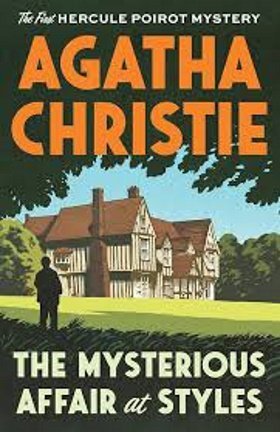“I don’t know. I’ve given up trying to guess what he’ll do next.”
“Is he quite mad, Mr. Hastings?”
“I honestly don’t know. Sometimes, I feel sure he is as mad as a hatter; and then, just as he is at his maddest, I find there is method in his madness.”
“I see.”
In spite of her laugh, Mary was looking thoughtful this morning. She seemed grave, almost sad.
It occurred to me that it would be a good opportunity to tackle her on the subject of Cynthia. I began rather tactfully, I thought, but I had not gone far before she stopped me authoritatively.
“You are an excellent advocate, I have no doubt, Mr. Hastings, but in this case your talents are quite thrown away. Cynthia will run no risk of encountering any unkindness from me.”
I began to stammer feebly that I hoped she hadn’t thought—— But again she stopped me, and her words were so unexpected that they quite drove Cynthia, and her troubles, out of my mind.
“Mr. Hastings,” she said, “do you think I and my husband are happy together?”
I was considerably taken aback, and murmured something about it’s not being my business to think anything of the sort.
“Well,” she said quietly, “whether it is your business or not, I will tell you that we are not happy.”
I said nothing, for I saw that she had not finished.
She began slowly, walking up and down the room, her head a little bent, and that slim, supple figure of hers swaying gently as she walked. She stopped suddenly, and looked up at me.
“You don’t know anything about me, do you?” she asked. “Where I come from, who I was before I married John—anything, in fact? Well, I will tell you. I will make a father confessor of you. You are kind, I think—yes, I am sure you are kind.”
Somehow, I was not quite as elated as I might have been. I remembered that Cynthia had begun her confidences in much the same way. Besides, a father confessor should be elderly, it is not at all the role for a young man.
“My father was English,” said Mrs. Cavendish, “but my mother was a Russian.”
“Ah,” I said, “now I understand——”
“Understand what?”
“A hint of something foreign—different—that there has always been about you.”
“My mother was very beautiful, I believe. I don’t know, because I never saw her. She died when I was quite a little child. I believe there was some tragedy connected with her death—she took an overdose of some sleeping draught by mistake. However that may be, my father was broken-hearted. Shortly afterwards, he went into the Consular Service. Everywhere he went, I went with him. When I was twenty-three, I had been nearly all over the world. It was a splendid life—I loved it.”
There was a smile on her face, and her head was thrown back. She seemed living in the memory of those old glad days.
“Then my father died. He left me very badly off. I had to go and live with some old aunts in Yorkshire.” She shuddered. “You will understand me when I say that it was a deadly life for a girl brought up as I had been. The narrowness, the deadly monotony of it, almost drove me mad.” She paused a minute, and added in a different tone: “And then I met John Cavendish.”
“Yes?”
“You can imagine that, from my aunts’ point of view, it was a very good match for me. But I can honestly say it was not this fact which weighed with me. No, he was simply a way of escape from the insufferable monotony of my life.”
I said nothing, and after a moment, she went on:
“Don’t misunderstand me. I was quite honest with him. I told him, what was true, that I liked him very much, that I hoped to come to like him more, but that I was not in any way what the world calls ‘in love’ with him. He declared that that satisfied him, and so—we were married.”
She waited a long time, a little frown had gathered on her forehead. She seemed to be looking back earnestly into those past days.
“I think—I am sure—he cared for me at first. But I suppose we were not well matched. Almost at once, we drifted apart. He—it is not a pleasing thing for my pride, but it is the truth—tired of me very soon.” I must have made some murmur of dissent, for she went on quickly: “Oh, yes, he did! Not that it matters now—now that we’ve come to the parting of the ways.”
“What do you mean?”
She answered quietly:
“I mean that I am not going to remain at Styles.”
“You and John are not going to live here?”
“John may live here, but I shall not.”
“You are going to leave him?”
“Yes.”
“But why?”
She paused a long time, and said at last:
“Perhaps—because I want to be—free!”
And, as she spoke, I had a sudden vision of broad spaces, virgin tracts of forests, untrodden lands—and a realization of what freedom would mean to such a nature as Mary Cavendish. I seemed to see her for a moment as she was, a proud wild creature, as untamed by civilization as some shy bird of the hills. A little cry broke from her lips:
“You don’t know, you don’t know, how this hateful place has been prison to me!”

























